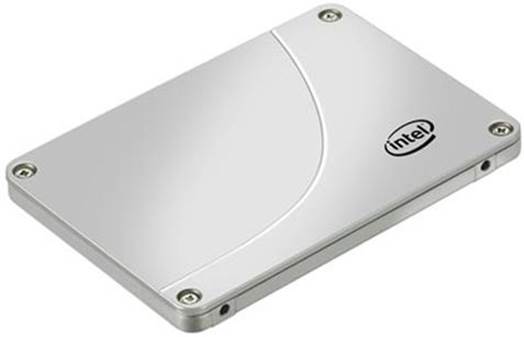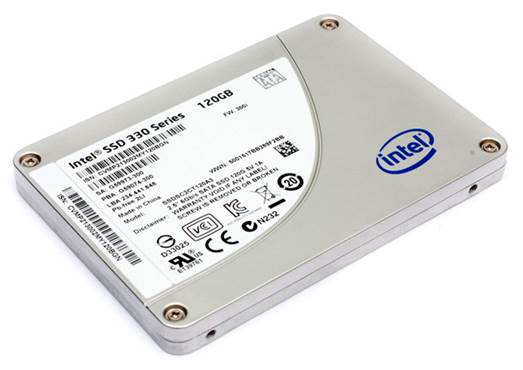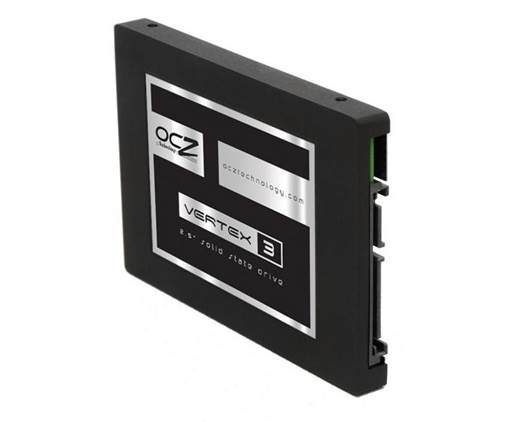Vital statistics
·
Price: $164.8
·
Manufacturer: Intel
·
Web: www.intel.com
·
Capacity: 180GB
·
Memory type: MLC synchronous
·
Controller: SandForce 5F-2281
·
Interface: SATA 6Gbps
·
Peak performance: 500MB/sread, 45 OMB/s write
·
Max lOPS: 52k

Intel
330 Series 180GB
What on Earth is Intel still doing slogging
it out in the solid-state storage game? Or more specifically what is Intel
doing flogging consumer grade SSDs?
To be clear, we're not asking that question
because Intel's SSDs are irretrievably crappy. In some ways, which we'll come
to presently, they're among the very best on the market. But they're not
clearly the best all-round, and they’re no longer based purely on Intel's own
technology either.
Indeed, Intel has had to eat some humble
SSD pie and jump onto the SandForce silicon bandwagon. More than enough for an
upset stomach, we're sure you’d agree. The problem is, Intel jumped late and
the SandForce controller has since been overtaken by many metrics. More to the
point, by virtue of buying in controller chipsets, Intel is both diluting the
'Intel Inside' proposition and squeezing its margins.
At the same time, the ever mightier Samsung
is going from strength to strength with its own drives, which you can't help
notice are pure Sammy. In the consumer class SSDs, it's hard to see why Intel
bothers.
If that's the general context for Intel
SSDs, what to make of this particular specimen, the BBO Series in 180GB
configuration? On paper, it's interesting because it offers an alternative
capacity to the default 120GB and 240GB options. Price wise, it clocks in a
little over $160, which is about right given that drives in the 120GB to 128GB
range usually start around $112, while the 240GB and 256GB efforts are nearer
$224. If you want a little more capacity for that Steam install but don't fancy
stretching all the way to $224, Intel is giving you an option
Of course, an Intel drive Ata competitive
price means something's gotta give. Like the pricier 520 Series, we're still
talking SandForce SF-2281 in terms of controller hardware, and a 6Gbps SATA III
interface. So the difference is all in the flash memory. The 330 makes do with
cheaper, lower endurance NAND. Intriguingly, however, it's still sychronous,
not the slower asynchronous variety we'd originally assumed Intel would use on
this series.
Sweet for some
That said, it's claimed performance is
clearly down compared to Intel's flagship 520 Series drives, with IOPS taking
the most obvious hit. This 180GB model is also suboptimal in that it pairs 12
memory chips with eight memory channels, which is never going to be the most
efficient use of resources.

Intel
330 Series 180GB
And so it proves in our benchmarks, with
the 330 Series 180GB performing well enough, but not exactly pulling any
spectacular stunts.
Upsides include good 4k random write speeds
and a very strong result in our endurance test. Our results show almost no drop
off in performance after several fill and delete cycles.
On the other hand, there are plenty of
significantly faster drives here, both in terms of synthetics and real-world
applications. As ever, Intel's joker is its reputation for excellent
reliability and longevity something the endurance test hints at. Combine that
with the niche-filling 180GB capacity and this SSD will certainly hit the sweet
spot for some, but probably not many.
KingSpec Challenge 240GB
Vital statistics
·
Price: $281.6
·
Manufacturer: KingSpec
·
Web: www.kingspec.com
·
Capacity: 240GB
·
Memory type: MLC synchronous
·
Controller: SandForce SF-2281
·
Interface: SATA 6Gbps
·
Peak performance: 500MB/sread, 480MB/swrite
·
Max IOPS: 50k

KingSpec
Challenge 240GB
Never heard of KingSpec? Until recently,
nor had we, but we always welcome new entrants that might keep the competition
on its toes is a good thing.
What's more, the KingSpec Challenge E3000
240GB is based on some reassuringly familiar technology. We're talking the
SandForce SF-2281 controller. Until recently, the SF-2281 was our favourite SSD
controller and while it's just beginning to look past its best, it's still a
decent goer.
What we're not clear on is from whence the
E3000's firmware has come. There are several options, starting with simply
taking SandForce's reference firmware off the shelf to giving it a tweak or
cooking up something entirely bespoke. In the absence of much of a hullabaloo
regarding the latter, we suspect it's one of the first two.
Similarly, we're not 100 per cent clear on
the type of flash memory inside. As a SandForce based drive, the options are
MLC NAND in either ONFi 1.0 asynchronous or ONFi 2.0 synchronous spec. Given
the $281.6 pricing for this 240GB model, we'll assume the latter. This is not
exactly a bargain basement drive.
Elsewhere, the numbers look largely as
you’d expect from a SandForce based SSD, with peak sequential reads and writes
in the 500MB/s region and roughly 50k for maximum IOPS. Indeed, if the
SandForce controller is showing its age anywhere, it's that claimed IOPS
performance. The best controllers are now claiming around double the EBOOO's
IOPS. Scary.
It's also worth remembering that nothing
has changed regarding the SF-2281 controller's reliance on compressible data to
achieve its best results. It's a ruse that we've never been entirely
comfortable with given that the sort of large files you might be shunting around
in sequential fashion are exactly the kind that can't be compressed: images,
video, music, in other words.
Writer's block
That said, we still weren't expecting the
E3000 to perform quite so badly in the AS SSD incompressible sequential write
test. While the E3000 knocks out 528MB/s using the ATTO benchmark's
compressible data, it plummets to just 140MB/s with AS SSD.

KingSpec
Challenge 240GB
The E3000 is a little sluggish in our
application benchmarks too. It labours through the game install test in 39
seconds around a third slower than the fastest SSDs here. It's not electrifying
in file decompression, either. As for endurance, a little drop off is evident
following a few fill-and-delete cycles, but nothing too dramatic.
All of which makes for a fairly mixed bag for
the E3000. It's by no means a bad drive. That AS SSD sequential write result
aside, there are no horrors in the results.
But this is a fairly pricey drive, which
makes for a difficult comparison with cheaper alternatives in the 240 to 256GB
range. Drives like the Samsung840 and the Vertex 4 from 0CZ are all cheaper and
faster. Then factor in KingSpec's unfamiliarity and it’s very difficult to make
a case for a relatively unknown brand. We're all for sticking up for the little
guy. Fie just has to give us a bit more to go on.